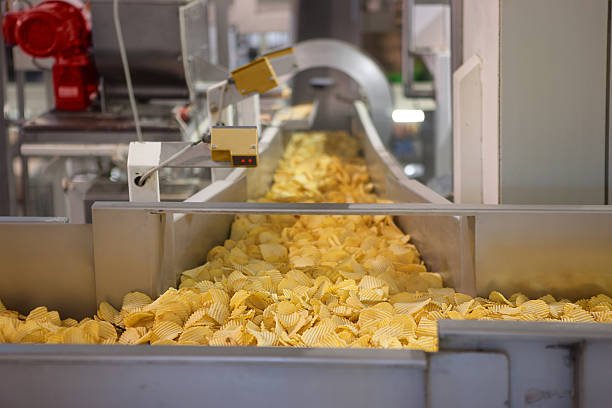What is an Automatic Potato Chips Production Line?
An automatic potato chips production line is an integrated system designed to streamline the process of converting raw potatoes into finished potato chips through a series of automated operations. The production line typically includes several key stages such as washing, peeling, slicing, blanching, frying, seasoning, and packaging. Each stage is equipped with specialized machinery that operates in a continuous and synchronized manner to ensure high efficiency and consistent product quality. The automation of these processes reduces manual labor, minimizes human error, and enhances overall productivity while maintaining stringent hygiene and safety standards.
View Loyal Potato Chips Production Line more to get into the details
Introduction to the Potato Chip Production Process
The potato chip production process involves a series of methodical steps, each crucial for transforming raw potatoes into the crispy snacks enjoyed by consumers worldwide. The journey begins with the selection of high-quality potatoes, which are then subjected to a rigorous cleaning process to remove dirt and impurities. Subsequently, the potatoes are peeled and sliced into uniformly thin pieces. These slices are blanched to eliminate enzymes that can cause discoloration and to achieve the desired texture. Following blanching, the slices are fried in hot oil to achieve the characteristic crispiness. After frying, the chips are seasoned with various flavors before being packaged for distribution.
Components of a Potato Chips Production Line
- Washing Machine: Efficiently cleans raw potatoes, removing dirt, debris, and impurities.
- Peeling Machine: Removes the skin from the potatoes, preparing them for slicing.
- Slicing Machine: Cuts the potatoes into uniform slices, ensuring consistent thickness.
- Blanching Machine: Par-cooks the slices, halting enzymatic activity and improving texture.
- Frying Machine: Cooks the potato slices in oil, giving them a crispy texture.
- Seasoning Machine: Applies flavors and seasonings to the fried chips evenly.
- Packaging Machine: Seals the seasoned chips in bags, ensuring freshness and shelf life.
Advantages of Using an Automatic Potato Chips Production Line
Implementing an automatic production line for potato chips offers numerous advantages. Primarily, it ensures a high level of efficiency as each component is designed to work in synergy, reducing bottlenecks and downtime. Consistency in product quality is another key benefit, as automation minimizes human error and standardizes each stage of the process. Furthermore, automation significantly lowers labor costs by reducing the need for manual handling. The enhanced hygiene and safety standards are of paramount importance, as automated systems are less prone to contamination and are easier to clean. Ultimately, an automatic production line enhances overall productivity, enabling manufacturers to meet increasing consumer demand while maintaining high standards of food safety and quality.
How Does an Industrial Potato Chips Production Line Work?
Stages in Potato Chip Production
The production of potato chips can be divided into several key stages. Initially, the selection and sorting of high-quality potatoes ensures the end product is of premium quality. Next, the potatoes undergo washing and peeling to remove dirt, debris, and skins. After peeling, the potatoes are sliced into uniform pieces using a high-precision slicing machine. Following slicing, the potato slices are blanched to inactivate enzymes and improve their texture. The blanched slices are then fried to achieve a crispy texture and golden color. Post-frying, the chips are seasoned to add desired flavors, and finally, they are packaged to preserve freshness and extend shelf life.
Role of Potato Chips Making Machines
Machines play a critical role in the production of potato chips, ensuring efficiency, consistency, and safety. The washing machine thoroughly cleans the potatoes, while the peeling machine efficiently removes the skins without excessive waste. The slicing machine guarantees uniformity in chip thickness, which is essential for even cooking. The blanching machine par-cooks the slices, improving their quality and shelf life. The frying machine cooks the chips to perfection, achieving the ideal texture and color. The seasoning machine ensures even distribution of flavors, enhancing the taste of the final product. The packaging machine seals the chips in moisture-proof bags, keeping them fresh and extending their shelf life.
Setting Up a Chips Processing Line
Setting up a potato chips processing line requires meticulous planning and a substantial initial investment. The first step involves selecting and acquiring the appropriate machinery based on production capacity and quality requirements. Facilities must be designed to ensure optimal workflow efficiency, with machinery arranged in a logical sequence to prevent bottlenecks. Investment in high-quality, durable machines can reduce maintenance costs and downtime in the long run. Worker training is crucial for the smooth operation of automated systems, ensuring that the workforce can handle, maintain, and troubleshoot the machinery effectively. Adhering to safety and hygiene standards is paramount, including installing appropriate ventilation systems and ensuring regular sanitation procedures. By implementing these measures, manufacturers can establish an efficient, high-output potato chips production line capable of meeting market demands.
What Are the Key Features of a Fully Automatic Potato Chip Production Line?
Incorporating a fully automatic system into potato chip manufacturing revolutionizes production by integrating advanced technologies that enhance efficiency, consistency, and overall output. A fully automatic potato chip processing line typically includes several key machines:
- Potato Washing and Peeling Machine: This machine ensures thorough cleaning and efficient peeling of potatoes, reducing manual labor and improving hygiene.
- Potato Slicing Machine: Equipped with adjustable blades, this machine allows for uniform slicing, which is critical for achieving consistent cooking results.
- Blanching Machine: This unit par-cooks the potato slices, helping to improve texture and color while also reducing the oil absorption during frying.
- Dehydrating Machine: By rapidly removing excess moisture from the potato slices, this machine prepares them for frying, which enhances their crispiness and reduces frying time.
- Frying Machine: Using precise temperature control, the frying machine cooks the slices to perfection, creating uniformly crispy and golden chips.
- De-oiling Machine: This device removes excess oil from the freshly fried chips, ensuring a healthier final product.
- Flavoring Drum: The flavoring drum evenly coats the chips with seasonings, ensuring consistent taste across the entire batch.
- Packaging Machine: An automated packaging system efficiently seals the chips in moisture-proof bags, protecting the product from spoilage and extending shelf life.
The automation of these processes not only increases production speed but also maintains a high level of product quality. Built-in monitoring systems and sensors ensure that each stage of production is meticulously controlled. Data collected during production can be analyzed to optimize operations, reduce waste, and prevent machine malfunctions. The integration of automated lines minimizes human intervention, thereby reducing labor costs and minimizing contamination risks, leading to a safer and more hygienic production environment. Overall, the adoption of a fully automatic potato chip production line enables manufacturers to meet high market demands with superior efficiency and consistent product quality.
How to Choose the Right Automatic Potato Chips Line?
Factors to Consider in a Potato Chips Plant
When comparing small and large potato chips production lines, several key factors need to be taken into account to make an informed decision:
- Production Capacity: The primary difference between small and large potato chips lines lies in their production capacity. Small production lines are suitable for businesses that aim to meet local or niche market demands, while large-scale lines are designed to cater to high-volume, mass-market needs.
- Initial Investment and Operating Costs: The initial investment for a large potato chips line can be significantly higher due to the need for more advanced machinery and infrastructure. Additionally, operating costs, including energy consumption, maintenance, and labor, are generally higher for larger setups.
- Space Requirements: Large production lines require considerably more space. It’s important to ensure that the facility can accommodate the equipment and allow for smooth workflow and compliance with safety regulations.
- Automation Level: Advanced automation features in large-scale lines can reduce labor costs and increase production efficiency. For smaller lines, a balance between manual and automated processes might be more cost-effective but could result in slower production rates.
- Flexibility and Scalability: Small production lines offer greater flexibility in terms of product variation and customization, making them ideal for small businesses looking to innovate and respond to market changes. Large lines, while less flexible, are scalable and designed to handle bulk production with consistency.
- Quality Control: Both small and large lines must maintain stringent quality control measures. However, large production lines often have more sophisticated real-time monitoring and automated quality control systems.
- Market Demand and Distribution Channels: A thorough market analysis can help determine the production scale necessary to meet demand. Businesses with extensive distribution channels may benefit from a larger production line.
Comparing Small and Large Potato Chips Lines
The key distinctions between small and large potato chips lines are summarized as follows:
- Small Potato Chips Lines:
- Lower production capacity
- Lower initial investment and operating costs
- More flexible and customizable
- Ideal for small businesses and startups
- Large Potato Chips Lines:
- Higher production capacity
- Higher initial investment and operating costs
- Less flexible but highly scalable
- Suited for established businesses with high market demand
Assessing the Scale of Potato Chips Production
Assessing the scale of potato chips production involves evaluating several crucial aspects:
- Market Analysis: Detailed market research and demand forecasting can help determine the necessary production scale. This includes examining consumer preferences, market trends, and competition.
- Resource Availability: Ensure that the necessary resources, including raw materials, labor, and utilities, are readily available to support the chosen production scale.
- Financial Considerations: Assess the financial implications of different production scales, including potential profits, return on investment, and risk management.
- Technological Integration: Evaluate the technology and equipment required for different production scales, considering factors such as efficiency, automation, and future upgrade possibilities.
- Regulatory Compliance: Ensure that the production facility meets all regulatory requirements, including food safety, environmental standards, and labor laws.
By carefully considering these factors, businesses can choose the right potato chips production line that aligns with their operational goals and market objectives.
What Are the Trends in Potato Chips Processing and Production?
Innovations in Potato Chips Processing
The potato chips industry has seen significant innovations aimed at improving efficiency, product quality, and sustainability. Advanced peeling technologies, such as steam and abrasive peelers, have drastically reduced waste and enhanced the quality of raw materials. Additionally, continuous fryers equipped with advanced heat control systems ensure consistent cooking, enhancing texture and flavor profiles. Novel slicing techniques such as water-jet cutting provide precision while minimizing damage to potatoes. Moreover, the adoption of integrated optical sorting technologies enables the removal of defective chips, thus maintaining high standards of product quality.
Growth of the Industrial Potato Chip Market
The industrial potato chip market has experienced robust growth due to factors such as increasing consumer demand, globalization, and advancements in production technologies. Urbanization and rising disposable incomes have spurred the demand for convenient and ready-to-eat snacks. Emerging markets, particularly in Asia and South America, are significantly contributing to this growth, driven by changing dietary habits and a growing middle class. Additionally, the market’s expansion is supported by the innovation in flavors and healthier options, catering to the diverse preferences of health-conscious consumers. As competition intensifies, companies are also investing in branding and marketing strategies to capture a larger share of the market.
Future of Fully Automatic Potato Chips Production
Fully automatic potato chips production represents the future of the industry, characterized by minimal human intervention and highly optimized processes. These state-of-the-art production lines incorporate cutting-edge automation technologies, such as robotic handling, IoT-enabled equipment, and AI-powered predictive maintenance. The benefits include increased production speed, higher consistency, and significant reductions in operational costs. Furthermore, these systems are designed for seamless scalability, allowing businesses to easily adjust production volumes to meet market demands. Enhanced data analytics capabilities also provide valuable insights into the production process, facilitating continual improvement and innovation. As sustainability becomes increasingly important, future automatic systems are expected to incorporate eco-friendly practices such as energy-efficient machinery and waste reduction protocols.






















